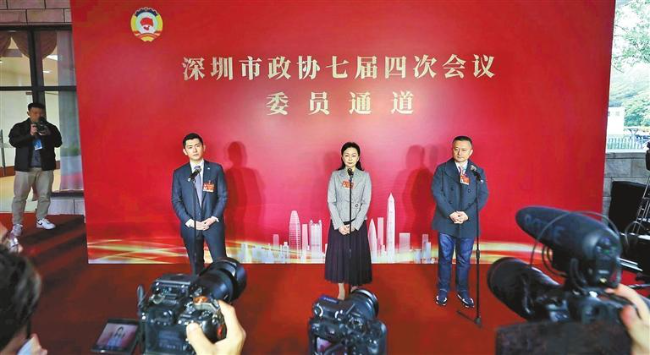Developing new high-quality productive forces urged
2024-01-30

Members of the Shenzhen Municipal Committee of the Chinese People’s Political Consultative Conference (CPPCC), the city’s political advisory body, speak to journalists during the ongoing annual session of the committee yesterday. Suggestions made by six interviewed political advisers from different sectors focused on hot topics such as artificial intelligence, new productive forces, and international communication. Shenzhen Special Zone Daily
TWELVE local political advisers placed emphasis on developing new high-quality productive forces and advancing new industrialization at a panel discussion during the ongoing annual session of the city’s advisory body Sunday.
The productive force is the combined power of labor and the means of production (resources such as land, factories and raw materials) to produce goods and services. It is the ability to create wealth as well as the basic driving force for social development.
Political adviser Chen Zhilie, who is also a deputy to the National People’s Congress and chairman of the Guangdong Federation of Industry and Commerce, suggested using new industrial control systems to create new high-quality productive forces. The aim is to connect the equipment of domestic and global industrial chain enterprises through the industrial internet, thereby enabling Shenzhen to leverage massive production and operation capacities.
He urged Shenzhen’s industrial development funds to support the establishment of the first national public service platform for evaluating and certifying the hardware and software performance of new industrial control systems.
Li Wei, chairman of Green Pine Capital Partners, suggested increasing financial support for scientific and technological innovation and application as well as tech startups.
Huang Tianhua, vice president of China International Marine Containers (Group) Co. Ltd., suggested promoting the integration of internet companies and manufacturing enterprises.
Deng Wenjun, senior vice president of Sangfor Technologies Inc., proposed creating an AI computing power platform to lower the threshold for using AI large-scale models across industries, thereby making AI technology more accessible to the general public.
Huang Dinglong, chairman and CEO of Malong Technologies, said promoting new industrialization will inevitably require a large number of “new workers” who differ from traditional workers in their “AI collaboration capability” (an ability to use AI to enhance day-to-day workplace performance). Therefore, he suggested enhancing the “AI collaboration capability” of Shenzhen’s population. This can be achieved by further integrating AI into basic education, vocational education, family education, and enterprise training.
Jiang Xiyong, co-founder and vice president of Linklogis Technology Group, urged the city to establish a shared computing platform to provide relatively low-cost, stable, and reliable computing resource services to small and medium-sized enterprises (SMEs) in the AI industry. The platform could offer services like AI computing power, storage, and data processing that would enable SMEs to access advanced AI technologies without heavy investment in infrastructure. This would help accelerate the development and application of AI in various industries and enhance the competitiveness of SMEs in the AI field.
Liu Chenli, vice head of the Shenzhen Institute of Advanced Technology of the Chinese Academy of Sciences and director of the National Biomanufacturing Innovation Center, proposed accelerating the development of the synthetic biomanufacturing industry as a new productive force. (Shenzhen Daily)
